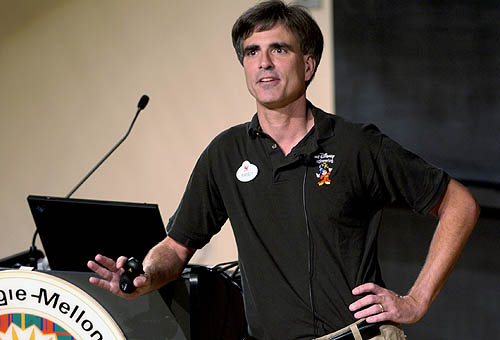
I just finished watching Randy Pausch's Last Lecture , and it was a hilarious and moving speech about Pausch's accomplishments as a professor, childhood dreams, and various kinds of advice that he passes on to the people he leaves behind. Randy Pausch was a professor at Carnegie Mellon University who was given about nine months to live because of multiple tumors on his liver. He powerfully delivers his last lecture, titled "Really Achieving Your Childhood Dreams", to a packed auditorium. In his lecture, Pausch proves to be intelligible, funny, witty, creative and beloved by most who knew him.
In the beginning of his speech, Pausch lists off numerous things that he dreamed of being when he was just a child. Some of his dreams included being an imagineer at Disney World, Being Captain Kirk from Star Trek, and even being a football player. At first glance, these seem like unreachable accomplishments, but the amazing thing about Randy Pausch is that he actually accomplished these dreams, for the most part. First, he never technically became Captain Kirk for obvious reasons and restrictions. However, he was able to meet him (William Shatner) when he came to visit Pausch to look at one of his Star Trek themed labs. Pausch was also asked to be an imagineer, (after many setbacks) and he even worked on the Aladdin themed ride at Disney World. Pausch proved that a dream, no matter how big, can be accomplished!
Randy Pausch also discusses some of his projects that he gave to students in his classes. The most amazing and creative one, though, involved assigning his students the task of designing their own virtual gaming world. He gave the students the assignment, which was to be due in just a couple weeks, and he admitted that he was absolutely stunned by the projects that the students came up with. He allowed the students to build on the projects for the remainder of the semester and the had a grand revealing of the virtual worlds when it was all over. Pausch said that the day of the revealing, he had a packed classroom filled with people that he had never even seen before. The project proved to be a success and was a great opportunity for the students to showcase their talents and bond with their project groups. The project became a huge event every year and was a great idea!
Another one of Randy Puasch's programs was called the Entertainment Technology Center (ETC), which he and a colleague came up with. The ETC is a two year master's program where, basically, artists and technologists team up to create projects each semester. It is strictly project-based and involves no book learning. The ETC is a great learning program and bagan reaching places overseas such as Singapore. Pausch mentions that he had even had people from businesses calling and offering jobs to his students as soon as they graduate from the program. Pausch seemed to be a great professor and a wonderful man. His last lecture was an encouraging speech about how he made his dreams come true and how to make yours come true, too.






